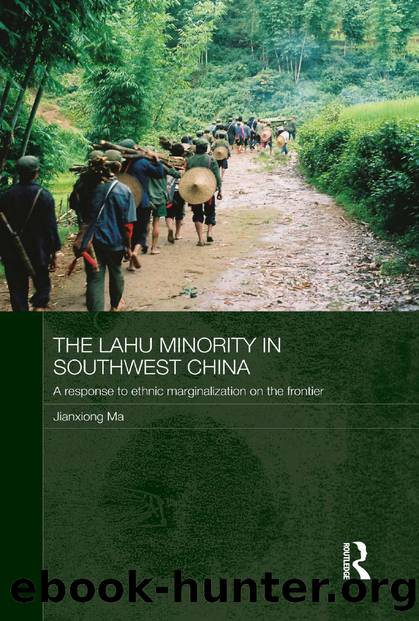The Lahu Minority in Southwest China by Ma Jianxiong;

Author:Ma, Jianxiong; [Ma, Jianxiong]
Language: eng
Format: epub
Publisher: Taylor & Francis Group
Published: 2013-08-15T00:00:00+00:00
5
âTo become wives of the Han'
Conflicts, marriage squeeze and the resettlement of women
DOI: 10.4324/9780203115640-5
Introduction
âTo become wives of the Hanâ is a saying of the Lahu in the Black River valley and nearby regions. It refers to their married or unmarried women, who want to resettle, or have resettled, in rural Henan, Shandong, Jiangsu, Zhejiang or in other provinces, through middlepersons, to become the wives of Han peasants. This pattern of ruralârural female migration is a one-way resettlement for minority women, and they have moved from a frontier, high-density ethnic minority region, to an inner or eastern Han Chinese-concentrated region. In this chapter, I use the term âresettlementâ to describe this one-way female migration for marriage between this ethnic minority and the Han Chinese. However, it is a migration pattern that has not been thoroughly discussed in the past from the perspective of ethnicity or migration in China. This kind of movement has increased since the 1980s, due to regional economic differences and the lack of women in the rural areas of various inner provinces. Based on intensive ethnographic data, I want to expose an underground network of middlepersons, through which the marriage squeeze, due to the disproportionate numbers between the sexes at the prime ages of marriage, could shift from the Han majority to ethnic minorities based on an ethnicity discourse of modernization.1 This discourse is not a new political interpretation, but presents itself anew within the contemporary Chinese market economy and the power of modernization, by which women can resettle themselves by giving up their ethnic identity and shifting from âthe Lahu womenâ to âthe wives of the Hanâ. This is to fill the gap left by rural Han women who, to some degree, have moved to urban areas. Meanwhile, they leave their Lahu brothers with the legacy of a community lacking women.
Due to many obstacles, such as illiteracy and language problems, most minority women have no way of returning and, because of the loss of their collective ethnic identity and day-to-day interactions in the community as the Lahu and the Wa, they have dispersed into different Han communities. The explanation for this middleperson-reliant resettlement is the lack of women in the rural marriage market in some provinces in China. One reason for this is linked with the ratio imbalance between the sexes at birth since the 1980s in rural China,2 which has been maintained for several decades; another reason that should be linked with the issue is that more and more unmarried women leave for urban areas as migrant workers, but some of them postpone their return, or do not stay in their villages, even if their return has been statistically recorded. Because of the patrilocal residence pattern and the patrilineal family ideology in Han Chinese society, sons must support their elderly parents at home, and the lack of women in such rural villages requires the import of more and more women from other regions. Therefore, this one-way marriage resettlement could not be regarded as trans-local in style,
Download
This site does not store any files on its server. We only index and link to content provided by other sites. Please contact the content providers to delete copyright contents if any and email us, we'll remove relevant links or contents immediately.
Spell It Out by David Crystal(36113)
Life for Me Ain't Been No Crystal Stair by Susan Sheehan(35807)
Cecilia; Or, Memoirs of an Heiress — Volume 1 by Fanny Burney(32549)
Cecilia; Or, Memoirs of an Heiress — Volume 2 by Fanny Burney(31948)
Cecilia; Or, Memoirs of an Heiress — Volume 3 by Fanny Burney(31932)
The Great Music City by Andrea Baker(31919)
Professional Troublemaker by Luvvie Ajayi Jones(29651)
The Secret History by Donna Tartt(19061)
We're Going to Need More Wine by Gabrielle Union(19038)
Twilight of the Idols With the Antichrist and Ecce Homo by Friedrich Nietzsche(18627)
All the Missing Girls by Megan Miranda(15965)
Cat's cradle by Kurt Vonnegut(15339)
Pimp by Iceberg Slim(14489)
Bombshells: Glamour Girls of a Lifetime by Sullivan Steve(14061)
For the Love of Europe by Rick Steves(13951)
Talking to Strangers by Malcolm Gladwell(13353)
Norse Mythology by Gaiman Neil(13352)
Fifty Shades Freed by E L James(13236)
The Social Justice Warrior Handbook by Lisa De Pasquale(12188)
